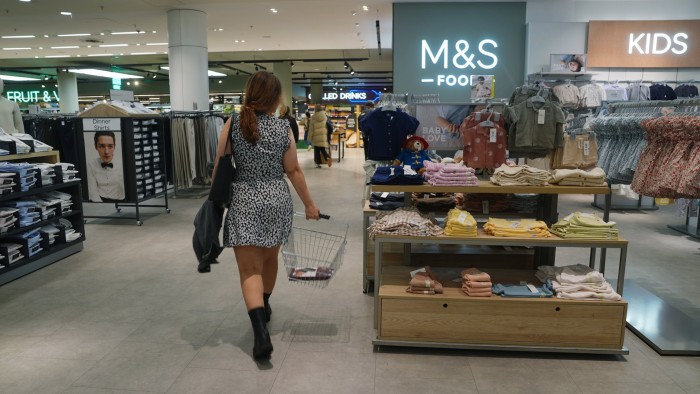Unlock the Editor’s Digest for free
Roula Khalaf, Editor of the FT, selects her favourite stories in this weekly newsletter.
A potential £300mn hit to profits; a month without online orders; gaps on the shelves; stolen customer data and now the chance the upheaval could last until July — this is the M&S cyber meltdown.
The enduring fallout from the cyber attack on one of Britain’s most beloved retail brands overshadowed an otherwise exemplary set of results this week. The numbers showed the City what every middle class female shopper already knew — M&S has finally got its mojo back in both food and fashion. But right now, if we want an Olivia von Halle cat print pyjama set we’ll have to go to a store and fight it out for one.
Investors, who have seen around £750mn wiped off the M&S share price since it was forced to pause online orders, were appeased with a 20 per cent dividend increase. But as the FTSE 100 retailer struggles to get its IT systems up and running again, the bigger question is how forgiving customers are going to be.
The surprising conclusion I’ve reached, after spending hours chatting to shoppers in stores and on social media, is very forgiving indeed.
Yes, customers are frustrated by not being able to order online and the poor availability of certain products. However, the most commonly expressed sentiment was that they were proud to support their beloved M&S, attacked by evil criminals.
“If there was ever a good time for M&S to have a crisis, it would be now,” says Richard Hyman, the veteran retail analyst, noting the “deep well of goodwill” Brits still hold for the brand that many of our mothers shopped for treats at.
In the long years M&S spent struggling with its product ranges, its ability to leverage this affection was weaker. Today, paying 40 pence for a paper union jack bag may make our noses wrinkle, but its recent fashion collaborations, booming beauty business, revamped food halls and tie-up with Ocado have won shoppers back (did I mention the chocolate coated custard creams?)
M&S did not divulge any post-cyber attack sales data this week. Despite all this sympathy, it is bound to be ugly. With the outage spanning two bank holiday weekends, two paydays and a heatwave, fashion rivals with fully functioning websites like John Lewis, Next and Boden will have stolen market share. When online orders finally return, will shoppers flock back?
M&S knows how to do a crisis; it also knows how to do crisis management. After the chaos in the immediate aftermath of the attack, customers have been kept informed with frequent updates — and importantly, apologies — via email and social media. It was open about the theft of customer data, issuing warnings about scam attempts. Shoppers are angry, but relieved it did not include their bank details.
The fact that the Co-op and Harrods have also been attacked, and that a third-party supplier is being blamed rather than weakness in M&S’s own systems, helps with the optics. Management may claim it’s a “bump in the road” but this is a nasty wake-up call for all consumer-facing businesses.
With web orders still paused, stores feel much busier than usual. M&S has sensibly responded by increasing the number of hosts stationed by tills and store entrances by 75 per cent. It claims it has a “zero wait time” for shoppers calling its customer service hotline (I rang to test this and got through to a human straight away). Staffing up will be expensive, but experts think the investment will pay off.
“Many organisations not as focused on the customer as M&S would not survive a £300mn hit to profits,” says Jo Causon, chief executive of the Institute of Customer Service. Incredibly, M&S remains top in YouGov’s latest customer trust rankings, which polled shoppers after the hack.
The true extent of the financial damage rests on future fines, insurance payouts and how quickly systems come back online. Analysts agree M&S should not risk customer fury by rushing things: “They’ve got one chance to get this right,” says one.
For all his cool handling of the crisis, the dent in the M&S share price means chief executive Stuart Machin faces a £1mn hit to his pay package. However, if anyone deserves a bonus, it is the frontline staff. They have done more than keep the stores open; they have protected the brand, greeting disgruntled customers with stoicism and a smile. These human interactions are crucial and should not go unrewarded.
Given shopper loyalty, it is ironic that Sparks, the M&S customer loyalty programme, is truly pants. There have been no offers in the app for weeks following the hack, but before they disappeared they were rarely very tempting. When the online business finally reopens, rewarding the patience of its faithful 18mn Sparks members with a decent promotional event would be a very good look for M&S indeed.
Claer Barrett is the FT’s consumer editor and author of the FT’s Sort Your Financial Life Out newsletter series; [email protected]; Instagram and TikTok @ClaerB
